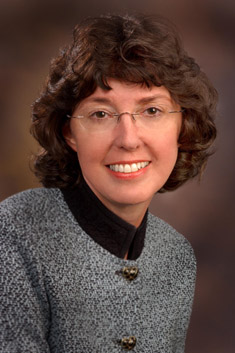

A publication of The Graduate School, University of North Carolina at Chapel Hill
On-Line Version Spring 2006
Home | Back issues | About us | The Graduate School | UNC-Chapel Hill | Make a gift
 |
|
Kay Wagoner's Carolina education and connections helped grow her pharmaceutical company, Icagen. |
Thinking Big
Carolina Network Paves Road to Success
When Kay Wagoner set out to launch the Durham-based drug-discovery firm Icagen in 1992, she was armed with more than her three Carolina degrees and 26 years of experience in health care and research. She had a supportive family and the personal determination to apply her experience toward something meaningful, drawing upon a work ethic forged from years of working to put herself through school.
But she also had the support of a network of scientists and business people who have helped her build an innovative pharmaceutical company on the cutting edge of health discovery.
“I’ve always had the luxury of having great people around me,” Wagoner said. “It’s been so beneficial to have people to turn to for suggestions about making the transition from academia to business.”
One of those people was Dr. Dennis Gillings, who served on the biostatistics faculty at Carolina from 1971 to 1988 before founding the clinical research company Quintiles Transnational in 1982. He now sits on Icagen’s board of directors.
Gillings’ experience was invaluable to Wagoner as she made the transition from a pharmaceutical researcher to CEO and president of an innovative bio-medical company that seeks treatments for illnesses such as sickle cell diseases, epilepsy and neuropathic pain.before.
Starting out, Icagen was little more than a computer and fax machine set up in a spare bedroom of Wagoner’s house, but it has since evolved into a leading biopharmaceutical company with more than 60 employees and assets of more than $59 million. The transition from humble beginnings to a company traded publicly on the Nasdaq was no easy task, and Wagoner turned often to Gillings for advice. After all, he had traveled that route before.
“It’s a great help
having the ability to have conversations with someone with his level of
success and maturity in business,” said Wagoner. “I can turn
to him for suggestions or advice about business and
he is always willing to help.”
Now, 13 years after taking those first few steps on her own, Wagoner has built Icagen into a leader in the field of ion-channel medicine, garnering the 2004 Entrepreneurial Excellence Award from the Research Triangle-based Council for Entrepreneurial Development, and the Ernst & Young Entrepreneur of the Year Regional Award for Life Sciences and Healthcare.
Wagoner credits both the support
of those she met in the UNC Chapel Hill community and her Carolina education
as key elements to her success. She earned her bachelor’s, master’s
and doctoral degrees
from Carolina, and in 2001 she was recognized with the school’s
distinguished alumna award for science and business. Equally important
to her, however, is something she refers to as her “education in
motion.”
Beginning her career first
as a hospital nurse before moving into teaching at the university level,
she later transitioned into pharmaceutical research management for Glaxo
Inc. While there, she initiated and led
ion-channel discovery research on the central nervous system, work that
ultimately equipped Wagoner with the knowledge and leadership experience
to co-found Icagen in 1992.
Wagoner continues to serve
as an adjunct professor of physiology at Carolina and also serves with
Gillings on Carolina’s Graduate Education Advancement Board, which
works to advance graduate education and secure funding for graduate students
through The Graduate School.
“Funding graduate students is incredibly important in efforts to remain competitive and attract better and greater numbers of students to Carolina,” Wagoner said.
Beyond devoting time to the board, Wagoner also supports a named fellowship in the Scholars For Tomorrow program, which provides a $5,000 annual award to an incoming UNC Chapel Hill graduate student in her name. Wagoner recognizes the impact funding can have for graduate students, having received scholarship funding herself while a graduate student at Carolina.
Martin Telko, the 2004 recipient of the Kay Wagoner and Ken May Fellowship for computational sciences, agreed that such support is important.
“Funding is a great recruiting tool for the university, and it can really sway an applicant to choose UNC,” he said.
In addition to funding, the fellowship program provides bi-weekly meetings and seminars where students from different disciplines exchange ideas and learn about research taking place among the fellows.
For Wagoner, giving back to the Carolina community is a way of adding value to an institution that has helped forge her path to success.
“I don’t know what it is about Carolina, but there’s no turning back once you are accepted into its community,” she said. “You can’t help but want to support that.”
- Daniel Johnson
© 2006, The Graduate School, The University of
North Carolina at Chapel Hill
All text and images are property of The Graduate School
at the University of North Carolina-Chapel Hill. Contact Sandra Hoeflich
at shoeflic@email.unc.edu
to request permission for reproduction.
Contact Deborah Makemson at makemson@email.unc.edu if you have technical problems with this Web site.